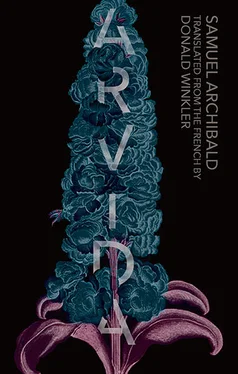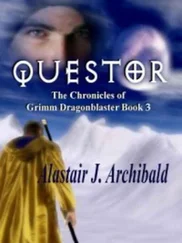“Dougie, will you please tell me what’s wrong with you? You scored sixteen goals this afternoon. How many do you need to make you smile?”
“Yes, I know, mama. I scored sixteen goals. But I didn’t win.”
In our family ever since, you will find a marked tendency to prefer even catastrophic defeats to tied games.
4 Only that’s not what he said in French. He said “ Héros de ma queue ,” which means “Heroes my… prick? cock?” Whatever. Had he said “Heroes my ass,” it would have come out “ Héros de mon cul. ” It was common in Arvida, in the somewhat coarse milieu of my father, in any case, to replace the traditional “ de mon cul ” by “ de ma queue .” Implicit in the expression is the awareness that the appendage in question is both the only thing a man possesses of which he is the sole owner, and the wellspring of all his misfortunes. An interesting variant consists in replacing the possessive “my” ( ma ) with a “your” ( ta ), while tacking an ending onto someone else’s sentence, usually to cut short any hint of boastfulness.
“Things going well at work, Jean Guy?”
“Oh yes, very well. They’ve just named me manager.”
“ De ta queue .”
God knows how he could get it into his head that two thousand dollars would be enough for him to kill somebody. What does it mean, after all, a sum like that? He could easily have worked it out, Raisin, he always spent in multiples of twenty. Two thousand dollars was never more than two hundred cases of beer / a hundred nights at the movies if you counted the popcorn, the Pepsi and the bus / thirty or so half-hours in the little room with the girls from the topless bar who never charged him like the others when they did consent to take his money. They arrived from everywhere those girls, on the three a.m. bus that left them off in front of the gas station, mostly on Wednesdays. From time to time Raisin stayed up late and hung around to watch the new ones disembark. There were three or four per week. Lots of Blacks for the last two years. The clients weren’t too happy about that, people didn’t go much for Blacks around here. But he liked them a lot. The girls had beautiful fat asses, little breasts with big black nipples, they sprayed themselves with a revolting scent, part pine oil, part bubble gum, but Raisin dreamed that it smelled of the far away, the not here. For him this was the aroma of Africa and Haiti, and the smell was good. A lot better in any case than the odour of the pulp and paper mill that lingered in the air in the heat of summer, and that the faintest breeze wafted abroad, pristine and potent, for kilometres round about. The locals were used to it, but not him, the smell lodged in his nostrils, stuck to his palate, a ghastly stench of rotten eggs.
He could have tallied it any old way, but try to figure how such minds work.
There were about a dozen of them, the last-born, all burdened with a nickname they hated, born into old-style families to aging ladies who ought to have stopped having children long before, but whose husbands and priests never gave them any peace as long as there was one egg left in their innards. Their brothers and sisters had left town to become doctors and lawyers or else had stuck around and found work in the factory, like their fathers. These were all getting close to retirement. As for the last-born, they never strayed very far. A few had just reached their forties, and lived at home with their parents until the parents died. After, their brothers and sisters pocketed the money from the house sale, and the last-born went to live on their disability pensions or their welfare cheques in low-rent lodgings, apartment blocks or semi-basements, at the four corners of the town.
They made it through the month doing odd jobs. From time to time, in the summer, on the first of the month, at the neighbourhood fairs or when some of them had made more money than expected on a little rebuilding contract, they got drunk. They were found in the morning, asleep in the town’s parks or on strangers’ lawns, fallen in action on the return trip by foot or bicycle. Raisin was one of the better coordinated: most often they found him on the same lawn, that of the Laberges, in the same position (an improbable intertwining of his limbs with the wheels and frame of his old ten-speed), barely the worse for wear or miraculously untouched. The Laberges were affable and gentle folks, once friends to his parents. They never woke him. It was July’s burning sun or the chill of late August mornings that brought him back to life and sent him wobbling homeward.
None of the last-born were truly cretins or morons, even if that’s what giggling children sometimes accused them of on their way out of school. None of them were Nobel prize-winners in chemistry either. In those parts, people sometimes said that someone was “not nasty enough to start a fire, but also not bright enough to put it out.” That was not a bad depiction of the last-born. There was no raving madman in their ranks, no one severely handicapped mentally, but they were all lacking in some small thing.
Bozzo, up to Grade 10, had been good at arithmetic and dictation, but he couldn’t finish a sentence if his life depended on it. He knew just what he wanted to say, took a deep breath, started to speak, but after a few words had to stop short. Syntax shrivelled up in his mouth and ideas unthreaded in his mind as soon as he tried to relay them from his neurons to his vocal chords. He could only express himself in puny little sentence fragments, and most of the time opted to laugh or grunt. Or swear. Swearing was practical, with the right inflection it could say all sorts of things, and in just one word. He would put several end to end without losing track. Jesus Christ goddamn piss-all fuckshit son of a bitch.
Minou had the clearest skin, the bluest eyes, and the most sublime face a man could have, but even when his mother was absent he was not the sharpest member of the household, which also included three cats, a poodle, and a king parrot. Among the last-born he was the youngest, and perhaps the only one who would not be left to his own devices when his mother died. Minou was a total ninny. What was odd was that on festive occasions, when his mother dressed him up in a good suit, he looked like a model. He was so comely that from time to time young women refused to admit to themselves that he hadn’t changed, even when they saw all the signs. Once, at a Dubé boy’s baptism, a lady led him behind a shed, took hold of his hand, and slid it under her skirt and between her legs, until Minou’s fingers made contact with her unclad sex. Minou took off wailing like one possessed, and he was found two days later rolled into a ball under a fir tree on the golf course, almost ten kilometres away.
Caboche had a head too big for his body and always had to lean it against something when he was seated, otherwise it could drop down and pop his vertebrae. The year before, while he was caddying for the Knights of Columbus classic golf tournament, an exceptionally long drive by the notary Lalonde had bounced off the top of his skull. That hadn’t helped at all.
Jambon was a chatterbox and an epileptic.
Popeye talked a lot as well, except that what he said was always inaudible, even more so when he drank and appeared to be expressing himself in a foreign language.
Among the last-born, Raisin was the most cunning, and he was strong as a horse. That gave him a certain prestige, because he was the one who worked the most. The only problem was his fingers. They were like thick carrot stubs, and just as useless. You couldn’t do much with fingers like that, not typing at a machine or playing the piano, not even digging in your nose. Once he’d got hold of an object, he could lift it and manipulate it almost normally until it dropped from his hands. He was called on for house moving, for mowing lawns, or outside renovation jobs. He was reputed to be good for “heavy work.”
Читать дальше












